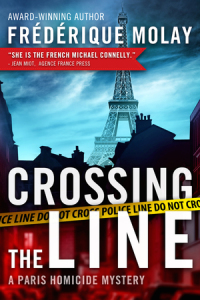Thanks for French writer Frédérique Molay for guest posting today. A quick note that I’m posting on the Writers on the Storm blog today on Making Our Content Work Harder for Us. Thanks!
So just how do you write a good mystery? Well, I’m going to have to disappoint. I don’t have a secret recipe—for mystery writing, that is. I do have one to make delicious cookies, hot from the oven, but my repertoire doesn’t have step-by-step instructions for writing a good novel.
There is some good news though: it is possible to list some of the ingredients that belong in a good mystery. Just explore Raymond Chandler’s “10 Commandments for the Detective Novel,” or S.S. Van Dine’s “20 Rules for Writing Detective Stories,” published by American Magazine in 1928. That said, don’t be fooled, mystery is a genre that appears simple, but hides complexity.
To start, of course, all you need is a detail. A face, an anecdote, a press clipping or a work of art will do. Inspiration can come from any number of places. Anything could trigger a story, which can then unfold, like a movie in your mind.
Once you have a detail, you need to build the plot. In mysteries, there is always a crime—a murder, kidnapping, or heist, or perhaps a coded message or disappearance. It is important to control the story line and the clues that are revealed, because nothing can be left to chance. The strings all need to be connected, and they need to be credible. Van Dine’s rule number 1 reads, “1. The reader must have equal opportunity with the detective for solving the mystery. All clues must be plainly stated and described.” That should not keep both reader and detective from surprising each other.
Mysteries also need charismatic characters. They need to make the reader feel fear, intrigue, and suspense. They need a fast pace, alternating dialogue, description and actions. All these elements help keep the reader turning the pages, which is the goal.
I’d also say that mysteries require a two-fold personality—writers need to dream and be creative, all the while honing mathematical precision. You need to have your feet on the ground and your head in the clouds—in dark, stormy clouds. This genre does more than entertain. It explores our deepest fears and anxieties. It distracts readers with stories about life’s troubles waters, translating the scandals we all experience everyday. Mysteries are a pulse-throbbing fictional investigation into the truths of human life.

